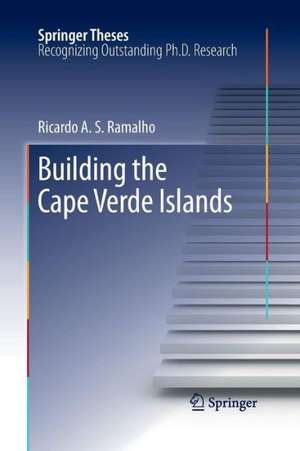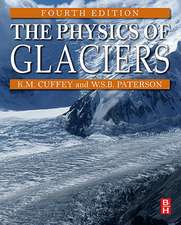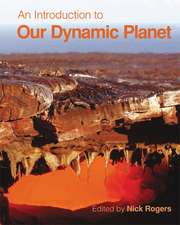Building the Cape Verde Islands: Springer Theses
Autor Ricardo A. S. Ramalhoen Limba Engleză Paperback – 15 iul 2013
The work comprises a geological summary and detailed mapping of paleo sea level markers on Cape Verde. Isotopic dating of the markers shows that uplift on the islands over the last 6 Myr is up to 400 m, and that the uplift chronology varies among islands. Two processes act to raise the Cape Verde Islands. The dominant process is one that is local to individual islands. The regional, swell-related component is smaller, and possibly episodic. The observations provide strong constraints on swell development and on hotspot models.
| Toate formatele și edițiile | Preț | Express |
|---|---|---|
| Paperback (1) | 637.46 lei 6-8 săpt. | |
| Springer Berlin, Heidelberg – 15 iul 2013 | 637.46 lei 6-8 săpt. | |
| Hardback (1) | 640.88 lei 6-8 săpt. | |
| Springer Berlin, Heidelberg – 6 mai 2011 | 640.88 lei 6-8 săpt. |
Din seria Springer Theses
- 18%
 Preț: 997.88 lei
Preț: 997.88 lei -
 Preț: 389.88 lei
Preț: 389.88 lei - 15%
 Preț: 646.94 lei
Preț: 646.94 lei - 18%
 Preț: 943.43 lei
Preț: 943.43 lei -
 Preț: 399.29 lei
Preț: 399.29 lei - 18%
 Preț: 944.99 lei
Preț: 944.99 lei - 15%
 Preț: 636.80 lei
Preț: 636.80 lei - 18%
 Preț: 941.05 lei
Preț: 941.05 lei - 15%
 Preț: 643.16 lei
Preț: 643.16 lei - 15%
 Preț: 642.68 lei
Preț: 642.68 lei - 18%
 Preț: 1103.62 lei
Preț: 1103.62 lei - 20%
 Preț: 558.83 lei
Preț: 558.83 lei - 18%
 Preț: 1112.30 lei
Preț: 1112.30 lei - 18%
 Preț: 944.19 lei
Preț: 944.19 lei - 18%
 Preț: 1109.92 lei
Preț: 1109.92 lei - 18%
 Preț: 1217.27 lei
Preț: 1217.27 lei - 15%
 Preț: 640.06 lei
Preț: 640.06 lei - 15%
 Preț: 636.45 lei
Preț: 636.45 lei - 15%
 Preț: 640.06 lei
Preț: 640.06 lei - 15%
 Preț: 640.88 lei
Preț: 640.88 lei -
 Preț: 389.70 lei
Preț: 389.70 lei - 20%
 Preț: 563.91 lei
Preț: 563.91 lei -
 Preț: 393.35 lei
Preț: 393.35 lei - 15%
 Preț: 637.93 lei
Preț: 637.93 lei - 15%
 Preț: 641.85 lei
Preț: 641.85 lei - 18%
 Preț: 1225.94 lei
Preț: 1225.94 lei - 20%
 Preț: 551.36 lei
Preț: 551.36 lei - 18%
 Preț: 1229.10 lei
Preț: 1229.10 lei - 15%
 Preț: 639.25 lei
Preț: 639.25 lei - 18%
 Preț: 999.45 lei
Preț: 999.45 lei - 15%
 Preț: 640.06 lei
Preț: 640.06 lei - 18%
 Preț: 1220.45 lei
Preț: 1220.45 lei - 18%
 Preț: 1116.26 lei
Preț: 1116.26 lei - 18%
 Preț: 1110.72 lei
Preț: 1110.72 lei - 18%
 Preț: 1000.87 lei
Preț: 1000.87 lei - 18%
 Preț: 891.17 lei
Preț: 891.17 lei - 15%
 Preț: 640.06 lei
Preț: 640.06 lei - 5%
 Preț: 1154.07 lei
Preț: 1154.07 lei - 15%
 Preț: 635.96 lei
Preț: 635.96 lei - 15%
 Preț: 640.88 lei
Preț: 640.88 lei -
 Preț: 387.20 lei
Preț: 387.20 lei - 18%
 Preț: 1109.92 lei
Preț: 1109.92 lei -
 Preț: 385.25 lei
Preț: 385.25 lei -
 Preț: 385.25 lei
Preț: 385.25 lei - 18%
 Preț: 1112.30 lei
Preț: 1112.30 lei - 18%
 Preț: 999.45 lei
Preț: 999.45 lei -
 Preț: 386.99 lei
Preț: 386.99 lei - 15%
 Preț: 637.13 lei
Preț: 637.13 lei - 20%
 Preț: 554.21 lei
Preț: 554.21 lei - 20%
 Preț: 555.59 lei
Preț: 555.59 lei
Preț: 637.46 lei
Preț vechi: 749.95 lei
-15% Nou
Puncte Express: 956
Preț estimativ în valută:
121.98€ • 130.44$ • 101.70£
121.98€ • 130.44$ • 101.70£
Carte tipărită la comandă
Livrare economică 18 aprilie-02 mai
Preluare comenzi: 021 569.72.76
Specificații
ISBN-13: 9783642268076
ISBN-10: 3642268072
Pagini: 228
Ilustrații: XVIII, 210 p.
Dimensiuni: 155 x 235 x 17 mm
Greutate: 0.34 kg
Ediția:2011
Editura: Springer Berlin, Heidelberg
Colecția Springer
Seria Springer Theses
Locul publicării:Berlin, Heidelberg, Germany
ISBN-10: 3642268072
Pagini: 228
Ilustrații: XVIII, 210 p.
Dimensiuni: 155 x 235 x 17 mm
Greutate: 0.34 kg
Ediția:2011
Editura: Springer Berlin, Heidelberg
Colecția Springer
Seria Springer Theses
Locul publicării:Berlin, Heidelberg, Germany
Public țintă
ResearchCuprins
Preface.- Introduction.- The Cape Verde Archipelago.- Constraining the Cape Verde Swell using numerical models.- How to trace island freeboard.- Tracers of uplift and subsidence in the Cape Verde Archipelago.- Dating of sea-level palaeo-markers.- Vertical movements of Ocean Island Volcanoes: insights from a stationary plate.- Conclusions.- Future Work.- Bibliography.
Textul de pe ultima copertă
Hotspots are enigmatic surface features that are not easily explained in the framework of plate tectonics. Investigating their origin is the goal of this thesis, using field evidence collected in the Cape Verde Islands, a prominent hotspot archipelago in the eastern Atlantic Ocean. The approach taken is to document uplift of the islands relative to sea level and use the uplift features to test various models of hotspot development. Island uplift is thought to arise from the growth of the anomalously shallow seafloor on which the islands rest, known as the bathymetric swell, which is characteristic of hotspots.
The work comprises a geological summary and detailed mapping of paleo sea level markers on Cape Verde. Isotopic dating of the markers shows that uplift on the islands over the last 6 Myr is up to 400 m, and that the uplift chronology varies among islands. Two processes act to raise the Cape Verde Islands. The dominant process is one that is local to individual islands. The regional, swell-related component is smaller, and possibly episodic. The observations provide strong constraints on swell development and on hotspot models.
The work comprises a geological summary and detailed mapping of paleo sea level markers on Cape Verde. Isotopic dating of the markers shows that uplift on the islands over the last 6 Myr is up to 400 m, and that the uplift chronology varies among islands. Two processes act to raise the Cape Verde Islands. The dominant process is one that is local to individual islands. The regional, swell-related component is smaller, and possibly episodic. The observations provide strong constraints on swell development and on hotspot models.
Caracteristici
Nominated by University of Bristol for a Springer Theses Prize. The work comprises a geological summary and detailed mapping of paleo sea level markers on Cape Verde. The observations described in this thesis provide strong constraints on swell development and on hot spot models. Includes supplementary material: sn.pub/extras













